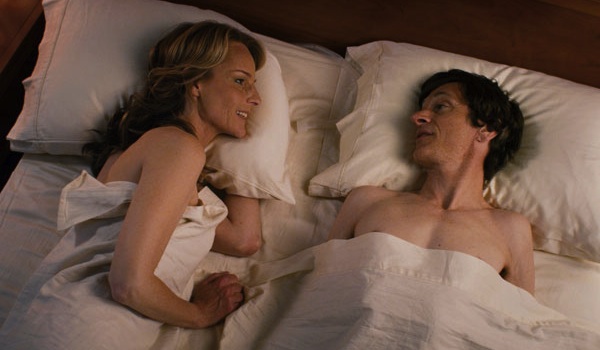The Sessions Review
There’s a monologue just past the halfway point of Ben Lewin’s The Sessions that’s so lovingly written it could bring a tear to your eye. It isn’t a thoughtful poem (though the film has plenty of those) but more of a love letter—a love letter to sex.
It seems like Mark O’Brien (John Hawkes) will melt when he describes the moment he lost his virginity. His body has been crippled from a childhood bout with polio, and while he has no control over his muscles (he can only move his head to one side), he’s lived a rather full life. All that’s missing as the film opens is a woman, and whenever he seems to have found one, he jumps into the deep end far too quickly, even going so far as to propose marriage to a caretaker not long after she starts working for him.
When Cheryl (Helen Hunt) enters Mark’s life, it’s with a promise of hands-off, no-questions-asked sex. She’s a “surrogate”—different from a prostitute—who, over the course of six sessions, will help Mark learn his body and allow him to explore hers.
Needless to say, they move onto intercourse, but it isn’t an easy road getting there. Mark is incredibly nervous around Cheryl at first. When she tries to remove his shirt, he screams in pain—not because it hurts, but because he’s anticipating something uncomfortable. She puts his mind at ease, and as they become closer on a professional level, Mark once again finds himself smitten with someone who can’t reciprocate his feelings. Cheryl cares deeply for Mark, but she’s married. The complications that ensue drive the bulk of The Sessions‘ most emotionally potent material.
But it’s that one scene, that one gorgeously written scene, that distills The Sessions down to something more than a nice character piece. Mark, a writer, hangs on every one of his own words while he describes everything to his priest, Father Brendan (William H. Macy). “Show, don’t tell,” is the first rule of writing. Lewin had this on his mind while plotting this scene out. It’s evocative and incredibly sensual, and Hawkes’ delivery (as it is throughout the movie) is perfect.
The actor steps into a leading role for the first time in a major motion picture and gives a performance that’s nearly flawless. A lot is asked of Hawkes physically, but it’s also an emotionally bare performance. Mark is an incredibly vulnerable human being, and he puts up a wall of self-deprecating humor to cope. All these layers come through in Hawkes’ work. It’s really great stuff.
Helen Hunt isn’t quite as bare emotionally, but boy does she put herself out there physically. Of course, this isn’t the only reason why this performance works. Hunt enters the film a cold customer. “Tell me something about yourself,” Mark asks her. “I’m a very private person,” she replies. End of conversation. But following each session, she finds herself more involved in Mark’s plight. Her home life isn’t great, and she’s tempted by Mark’s warmth. It’s a conflict she internalizes quite a bit, which is great because The Sessions often falls too heavily on schmaltz—material Hunt hardly touches here.
Talking other flaws, Lewin’s direction is rather unremarkable, and the film’s conclusion feels quite rushed. Beyond that, The Sessions does precisely what you’d expect, exactly what you’d hope. It’s a sweet, tender story that doesn’t exactly bite, but hell if you don’t find yourself involved in it. And the performances are unmissable—Hawkes and Hunt have arguably never been better.
















